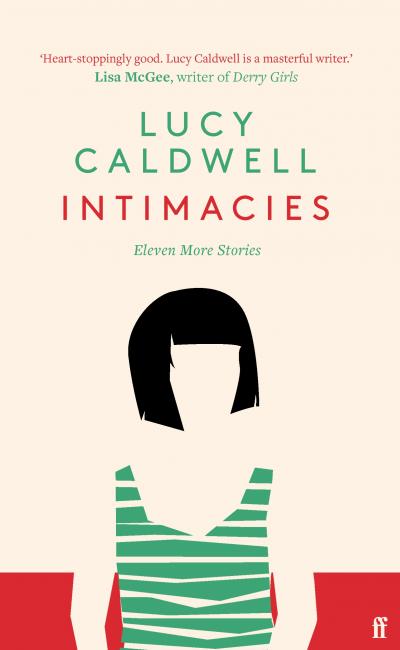In the first short story of Lucy Caldwell’s collection Intimacies, “Like This”, one of the worst possible things that could ever happen to a parent occurs. On the spur of a stressful moment in a café, an overloaded mother takes her screaming toddler to the toilet and leaves her baby in its pram with a woman she barely knows. When she returns, the pram is still there, but the baby is gone: “You have left the most helpless, precious thing you own with a complete and utter stranger.”
“It happens like this”, we are told at the story’s beginning. Such pointers highlight the tale’s artifice, signalling that this story could also be told differently. Indeed, the narrative doubles back on itself when we realise that the baby has not, in fact, been stolen, just taken for a walk. The mother’s experience is characterised by two extremes. When she has lost her child, she suffers from an irremediable incompleteness: “Still, nightly, year after year, your body aches for her.” But when that moment of heartbreak is over, she is transported back into the banality of childcare, barely able to remember how old her children are while she ferries them from place to place. Perpetually seeking a middle ground between exhaustion and anguish, she only seems satisfied, complete, for one brief moment, that split-second where her and her child are reunited and she drinks in “the soft downy hair on her head, her neck, the milky smell of her, this.”
 But this – a moment in a woman’s life where everything falls perfectly into balance – is hard to come by in Caldwell’s collection. To be a woman is often to occupy a dissatisfying, uncomfortable space, particularly as a mother. In “Words for Things”, the narrator’s mother says to her in passing “you’ll never be loved so much again” as she was in her childhood. It is this idea, of a moment between mother and child that is already gone before it even happens, that is crucial for Caldwell. Is that bond enough to make it all worth it? Intimacies are fleeting, barely there, barely satisfying. In “Intimacies”, the narrator enacts a cohesive conversation with a child that was never born, as if that interaction could only be had in the imaginary anyway. Otherwise, you are only a “good-enough mother”, and the intimacy you share with your children is at once too much and barely enough. These constitute Caldwell’s attempts to capture the intense yet always incomplete experience of motherly love.
But this – a moment in a woman’s life where everything falls perfectly into balance – is hard to come by in Caldwell’s collection. To be a woman is often to occupy a dissatisfying, uncomfortable space, particularly as a mother. In “Words for Things”, the narrator’s mother says to her in passing “you’ll never be loved so much again” as she was in her childhood. It is this idea, of a moment between mother and child that is already gone before it even happens, that is crucial for Caldwell. Is that bond enough to make it all worth it? Intimacies are fleeting, barely there, barely satisfying. In “Intimacies”, the narrator enacts a cohesive conversation with a child that was never born, as if that interaction could only be had in the imaginary anyway. Otherwise, you are only a “good-enough mother”, and the intimacy you share with your children is at once too much and barely enough. These constitute Caldwell’s attempts to capture the intense yet always incomplete experience of motherly love.
Caldwell was born in Belfast and studied at Queens’ College, Cambridge – two environments that manifestly inform this collection. The women in her stories are often torn between working out how they fit into a highfalutin academic environment where women’s voices have not always been heard, and more visceral bodily experiences. In “Words for Things”, the close textual reading practice of practical criticism (taught as part of the Cambridge English tripos) is juxtaposed with the banality of communicating solely in emojis, a habit which one character is “pretty sure […] coincided with parenthood.” The two tired mothers desire one another; their emoticon excesses work against the notion of close reading and create a space where their desires are legible, even if they are not directly articulated.
In “The Children”, the narrator’s research on the social reformer Caroline Norton intersects with the frightening sensation of finding a lump in her own breast and waiting on tenterhooks for a diagnosis. While the tumour in the end turns out to be benign, Caldwell once more teases out the distinctions between a positive femininity of the mind and the visceral, often painful experience of one’s own body, which can present problems despite women’s participation in positive academic spaces. The collection hints further at the way female bodies are continually subject to threat and marginalisation, from holding your keys as a “makeshift weapon” when walking home alone at night, to the hot, imagined panic of feeling “gloved hands on your shoulder” as you imagine someone is in your house, to the trauma of an illegal pill-based abortion in Northern Ireland.
These stories are often characterised by a sense of how things could have turned out differently. In “All the People Were Mean and Bad”, the protagonist sits next to a stranger on a plane, that conspicuously liminal space (in between times and places), and briefly fuses his identity with that of her absent husband, believing that someone else could play that role, or even surpass it, just for a little bit. But by the story’s end, they are “not a family at all but two entirely separate people now.” Many of the stories are characterised by that same sense of failure: what does not happen, the agony of messages that go unwritten: “once she even saw the dot, dot, dot of him composing a reply but then the dots went away and the reply never came.” Not everything can be expressed in this collection of female experience.
Somehow, things seem to turn out alright anyway, whether it’s a potentially devastating diagnosis that never comes, or a child who remains in their pram. But the duality of these stories leaves a space of incompleteness at each tale’s centre. We are haunted by the notion that things could have been otherwise; the sense of yearning that characterises the life of these women characters seems always to persist. This formulation of the female personality around lack is potentially problematic: does it endorse a Freudian conception of woman as always incomplete? Is she only whole in that one, perfect moment of reunion with a child, or when she finds the perfect partner – something which, incidentally, seems unachievable?
Equally, though, Caldwell’s collection speaks to the difficulty of feeling oneself to be whole as a woman – less imposing lack on the female body than exploring how it might be challenging for a woman to write beyond herself, as in “Monica Lewinsky”, where the narrator and her schoolgirl counterparts internalise derogatory views of women in their flippant comments on the Clinton-Lewinsky scandal. Yet still, in “The Children”, the narrator asks, “Please, don’t let up.” This appears as a call to arms to continue to write about female experience. Even if it is imperfect, difficult to pen, full of holes, we should keep on writing it anyway. This is the appeal of Caldwell’s stories with multiple outcomes, clever twists and empty spaces: they are necessarily incomplete, but also require us to keep on imagining new histories for women.
- Intimacies by Lucy Caldwell (Faber, £12.99)
- Read more book reviews and features on theartsdesk















Add comment